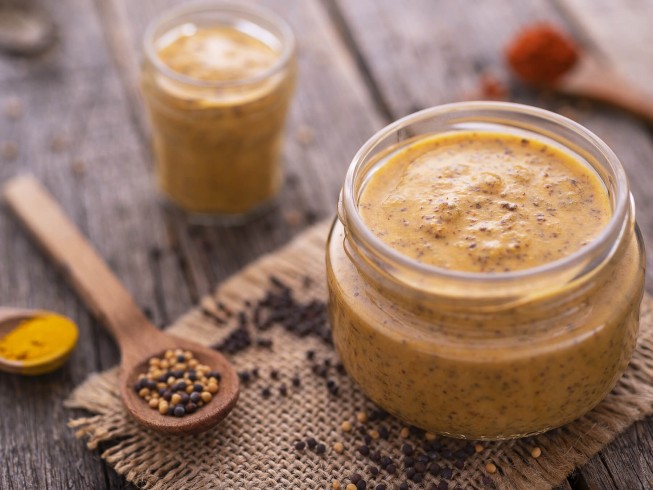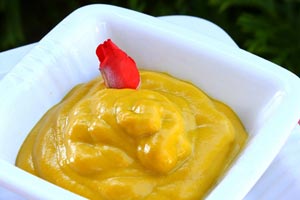A can of cream of mushroom soup can be a real dinner saver. It works great in casseroles and can turn into a sauce or gravy in a pinch.

A basic recipe for coarse ground mustard made from scratch. Add horseradish, dried herbs, or mayonnaise as desired to flavor it further.

1/3 cup mustard seeds
1/3 cup cider vinegar
1 clove garlic, peeled and cut in half
3 tablespoons water
3 tablespoons honey
1/4 teaspoon salt
1 pinch ground cinnamon
Combine the mustard seeds, vinegar, and garlic in a jar. Cover and refrigerate for 2 days.
Remove and discard the garlic. Transfer the vinegar and mustard seeds to a food processor. Add the water and process until smooth.
Stir the honey, salt, and cinnamon into the mixture and then transfer it back to the jar. Cover and chill for 1-2 hours before using. Store the mustard in the jar in the refrigerator for up to 1 month.
To flavor the mustard, stir in horseradish, dried herbs, or mayonnaise as desired.
Try different types of mustard seeds to find the flavor you prefer.
Feel free to adjust the sweetness and acidity.
Let the mustard sit in the refrigerator for at least 24 hours before using for a more developed flavor.
Combine the mustard with olive oil, vinegar, and herbs to create a flavorful salad dressing.
Use the mustard as a marinade for meats or a spread for sandwiches.
Try infusing the mustard with spices like turmeric, coriander, or chili for variety.
If you're looking for a creamier texture, consider blending in mayonnaise or sour cream after processing the initial mix.
Whisk mustard into sauces or gravies to boost their flavor.
When experimenting with flavor additions, start with small amounts and adjust to taste.
Mustard seeds are the small seeds of the mustard plant, and they can vary in color from yellow to black, each type providing a different flavor and heat level.
You can use yellow, brown, or black mustard seeds. Yellow seeds are milder, brown seeds are spicier, and black seeds are the hottest in flavor.
You can substitute cider vinegar with white wine vinegar, rice vinegar, or even lemon juice, though the flavor of the mustard may vary.
Soaking the mustard seeds in vinegar allows them to absorb the liquid, soften, and eventually become more palatable while releasing their flavors.
To reduce the heat, soak the seeds longer, or use a higher proportion of honey. For more heat, use brown or black mustard seeds or add horseradish.
You can omit the honey for a spicier mustard or substitute it with another sweetener like maple syrup or agave nectar.
If your mustard is too thick, add more water or vinegar in small increments until you reach the right consistency.
Store the mustard in a clean, airtight jar in the refrigerator. It will keep for up to 1 month.
Freezing mustard is not recommended as it can alter the texture and flavor. It's best to store it in the refrigerator.
If you don't have a food processor, you can use a mortar and pestle, a blender, or finely mash the soaked mustard seeds with a fork or another type of manual grinder.
You can add ingredients like horseradish, dried herbs (like dill or thyme), cumin, paprika, crushed red pepper flakes, or mayonnaise for a creamier texture.
Coarse mustard is a type of mustard that contains partially ground or whole mustard seeds. Unlike smooth mustards like yellow or Dijon, coarse mustard has visible mustard seeds, which provide a slightly grainy consistency and a more intense, tangy, and spicy taste.
Food Processor: For blending the mustard seeds and vinegar until smooth after the initial refrigeration period. A high-powered blender can also be used as an alternative.
Measuring Cups and Spoons: For measuring ingredients like the mustard seeds, vinegar, and salt.
Garlic Press or Knife: If opting to crush the garlic clove instead of cutting it, a garlic press can make this easier. A sharp knife will also work for cutting the clove in half.
Glass Jar with Lid: For combining and refrigerating the mustard mixture. A jar with a tight-fitting lid will help keep the mustard fresh during storage in the refrigerator.
Spatula: For stirring the ingredients and scraping down the sides of the food processor.
Charcuterie Board: Spread this coarse mustard on a charcuterie board alongside cured meats and cheeses for a nice contrast.
Grilled Sausages: Slather the mustard on grilled sausages for an easy yet bold pairing. The mustard's texture and taste add a perfect kick to the savory, smoky flavors of the sausages.
Pretzel Bites: Use the mustard as a dip for warm pretzel bites. The combination of soft pretzel and zesty mustard creates a satisfying flavor pairing.
Roast Beef Sandwich: Add a generous spread of the coarse mustard to a roast beef sandwich. Its acidity pairs excellently with the richness of the beef.
Potato Salad: Mix this mustard into your potato salad for an elevated tang.
Salad Dressing: Whisk the mustard with olive oil, vinegar, and herbs to create a zesty dressing for salads. Its boldness will brighten up any green salad and add character to the overall dish.
Marinade for Chicken: Incorporate this coarse mustard into a marinade for grilled or baked chicken. Its acidity helps tenderize the meat while infusing it with flavor.
Deviled Eggs: Jazz up classic deviled eggs by mixing in some of the coarse mustard into the yolk filling. It adds a bit of a kick that contrasts nicely with the creaminess of the eggs.
Bratwursts: Serve bratwursts with a dollop of this mustard alongside crisp sauerkraut. The sharp flavor of the mustard balances the savory sweetness of the bratwurst.
A can of cream of mushroom soup can be a real dinner saver. It works great in casseroles and can turn into a sauce or gravy in a pinch.
If you're a fan of the menu at this American chain of restaurants which serves a variety of foods such as burgers, steaks, pasta, and seafood then you'll love this collection of copycat recipes.
In a cooking rut? Try one of these taste-tested, family-approved recipes using ground beef.

Online since 1995, CDKitchen has grown into a large collection of delicious recipes created by home cooks and professional chefs from around the world. We are all about tasty treats, good eats, and fun food. Join our community of 200K+ members - browse for a recipe, submit your own, add a review, or upload a recipe photo.

reviews & comments
November 26, 2021
This mustard is very flavorful and easy to make. It's perfect for sandwiches or turned into a sauce. I swap out the cinnamon for cayenne for a spicier version.